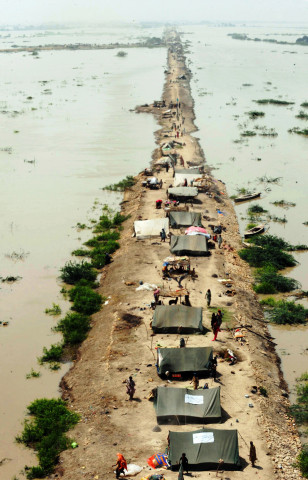Pucca intention to stay in the kachcha
As waters recede, people who live in the kachcha area are rushing to get back to their homes despite the danger.

Now that the waters are receding, people who lived in the kachcha area are rushing to get back to their homes. The Kachcha Bunder, as it is called, is treacherously muddy and laced with the threat of poisonous snakes and wild boar, but residents are afraid that if they are slow in going back to their houses, the government might seize the opportunity to raze their illegal settlements.
This was the same fear that had kept the kachcha residents in their homes even after the government had issued evacuation orders. But with their homes built right on the river, the residents eventually had to flee to avoid drowning.
For the past 50 years, Bushra’s family has been living on the strip that runs for about 2km along Sukkur’s Bunder Wall, a fortified levee to protect the city from the water. “I was born here, I got married to Shahid Ansari here,” she said, standing in the doorway to her house.
According to her, Nawaz Sharif’s government had tried to evict them but had backed off when the residents put up a stiff protest. This time too the government will have to face fierce opposition if it tries to pull down their homes, she warned.
The Kachcha Bunder area is in the middle of Sukkur city, with the River Indus snaking through it. The settlements started around 50 years ago with a couple of mud houses but over the years, the houses have become bigger and more elaborate. Even though the government never legalised the settlement, residents now have gas, electricity and telephone connections.
However, two days ago, the federal minister for labour and manpower, Syed Khursheed Ahmed Shah, while addressing a press conference in Sukkur, hinted at removing the illegal occupants of the Kachcha Bunder who, according to him, were damaging Sukkur Barrage and its bund wall.
But if the government does decide to take action against the settlers, they will have to prepare for a strong reaction.
“Our forefathers have made these houses, nobody can kick us out of here,” said Sikander Awan, a resident. According to him, the government had earlier offered them plots near the new bus terminal but the residents had refused because they felt the area was not safe.
Abdul Jabbar, who has been living in the kachcha area since 1965, said that if the government had really wanted them to move, they would have provided the residents with houses in the city rather than on the outskirts.
Similarly, Shahbaz Mirani, a labourer by profession, said that he spent most of his day outside his home. “But I have no worries about my family’s security because we live in such a peaceful area,” he said. “Why does the government want to snatch our homes,” he asked angrily, adding that it was “next to impossible” for the government to get these families to move.
The prospering locality is still attracting more people. Two years ago, Saleem Buriro bought a two-room house here for Rs250,000. The flood swept over the kachcha area completely and Saleem’s house too was damaged extensively.
“The house requires major repairs,” he said, adding that at least four feet of water had collected inside his house. Emphasising his home’s ideal location, Saleem reiterated that he would never move anywhere. “I’m living right in the centre of the city,” he explained.
However, while most of the residents shared the same determination to stay put in the kachcha areas, Muhammad Nadeem Ansari expressed the desire for a more stable life.
“I am tired of the constant threats of eviction,” he explained. “It makes everything so uncertain that I have not renovated my house. If it has to happen, it should happen at once.”
Published in The Express Tribune, August 29th, 2010.



















COMMENTS
Comments are moderated and generally will be posted if they are on-topic and not abusive.
For more information, please see our Comments FAQ